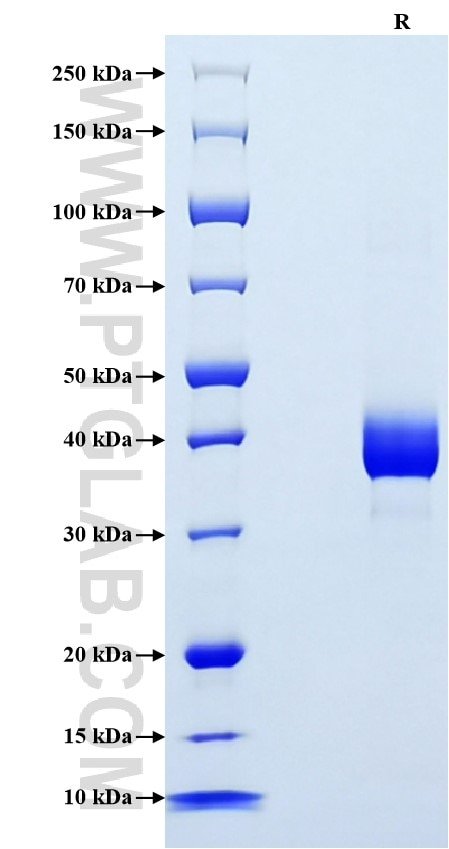Recombinant Mouse Resistin protein (rFc Tag)
Species
Mouse
Purity
>90 %, SDS-PAGE
Tag
rFc Tag
Activity
not tested
Cat no : Eg3391
Validation Data Gallery
Product Information
| Purity | >90 %, SDS-PAGE |
| Endotoxin | <0.1 EU/μg protein, LAL method |
| Activity |
Not tested |
| Expression | HEK293-derived Mouse Resistin protein Ser21-Ser114 (Accession# Q99P87) with a rabbit IgG Fc tag at the N-terminus. |
| GeneID | 57264 |
| Accession | Q99P87 |
| PredictedSize | 37.4 kDa |
| SDS-PAGE | 36-42 kDa, reducing (R) conditions |
| Formulation | Lyophilized from 0.22 μm filtered solution in PBS, pH 7.4. Normally 5% trehalose and 5% mannitol are added as protectants before lyophilization. |
| Reconstitution | Briefly centrifuge the tube before opening. Reconstitute at 0.1-0.5 mg/mL in sterile water. |
| Storage Conditions |
It is recommended that the protein be aliquoted for optimal storage. Avoid repeated freeze-thaw cycles.
|
| Shipping | The product is shipped at ambient temperature. Upon receipt, store it immediately at the recommended temperature. |
Background
Resistin, a cysteine-rich hormone secreted primarily by rodent fat cells, was postulated to be implicated in obesity, insulin resistance and diabetes. Resistin is also secreted by macrophages in humans, promoting inflammation (PMID: 20148674). Resistin modulates the synthesis and secretion of key pro-inflammatory cytokines such as TNFa, IL-6 and IL12 in macrophages via a nuclear factor-kB (NF-kB)-dependent pathway. Given the connection between inflammation and cancer, resistin was soon considered for its role in cancer. There were observations supporting its possible use as a diagnostic marker, expression levels of which also seemed to differ in patients with varying clinical stages. Resistin has been also linked to other pathologies such as atherosclerosis.
References:
1. Li, He et al. (2022) Cells.11(19):3001. 2. Reilly, Muredach P et al. (2005) Circulation.111(7):932-939.
